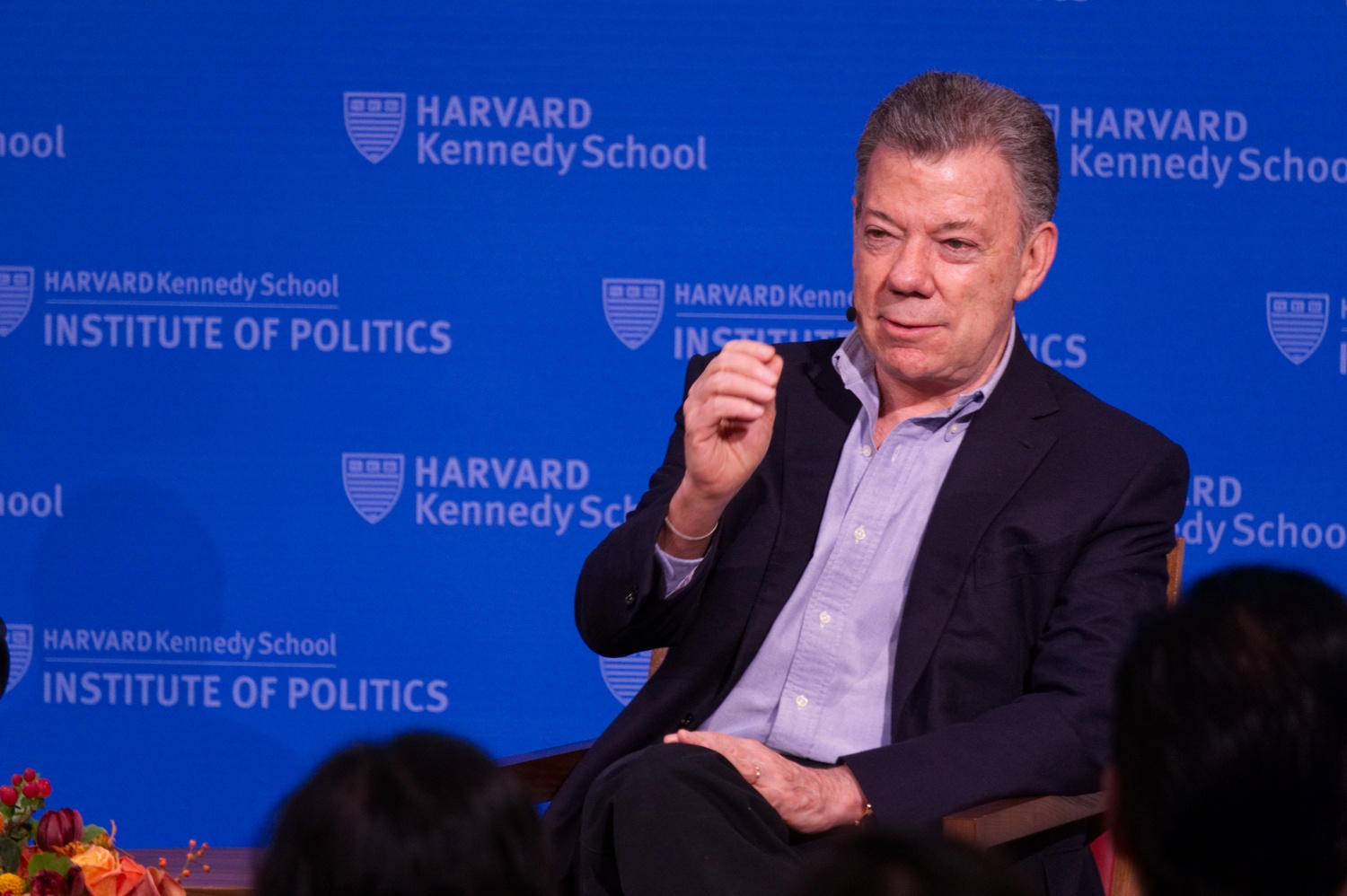
News
Progressive Labor Party Organizes Solidarity March With Harvard Yard Encampment

News
Encampment Protesters Briefly Raise 3 Palestinian Flags Over Harvard Yard

News
Mayor Wu Cancels Harvard Event After Affinity Groups Withdraw Over Emerson Encampment Police Response

News
Harvard Yard To Remain Indefinitely Closed Amid Encampment

News
HUPD Chief Says Harvard Yard Encampment is Peaceful, Defends Students’ Right to Protest
Former President of Colombia Talks Peacekeeping Efforts, Offers Advice to Harvard Students

Former President of Colombia Juan Manuel Santos spoke at the Harvard Kennedy School’s Institute of Politics on Thursday, reflecting on his experiences pursuing peace in Colombia and offering advice for attendees in light of the current international political climate.
In the week leading up to the event, Santos has been “very active,” speaking with University President Lawrence S. Bacow and meeting with professors and students to talk about the successful Colombia peace negotiations, according to moderator Nicholas Burns, a Kennedy School professor and former United States ambassador to NATO.
In his speech Thursday evening, Santos declared the importance of fighting poverty and climate change. He also detailed lessons he learned throughout his varied career as a journalist, economist, Minister of Defense, and ultimately as president of Colombia from 2010 to 2018.
Santos, who was the sole recipient of the Nobel Peace Prize in 2016, offered the audience a glimpse into his battle for peace in Colombia. He highlighted the key role that other countries played in the peace process, adding that “support from the international community was crucial.”
“This is the first process where the victims of the war are put in the center of the solution of the negotiations,” Santos said. “Their rights to the truth, their rights to reparation, their rights to justice, their right to non-repetition — that became the pillars of the negotiation. No other agreement ever had done this before, so we had a test case and a precedent and what we’ve been doing the past few days [at Harvard] was to give it an academic context.”
Santos has a long history with Harvard. He attended the Kennedy School — where he spoke Thursday night — and graduated with a masters in public administration in 1981. He was also a Nieman Fellow in 1988. He said Thursday that he sought advice from Harvard during his term as president on the “academic” and “theoretical framework” within which he could anchor his peace efforts in Colombia. He currently serves as the Angelopoulos Global Public Leaders Fellow at the Kennedy School.
Among other subjects, Santos canvassed the crisis in Venezuela and his one-time aspiration to become a journalist. He also related a few personal anecdotes involving U.S. presidents that set almost the entire audience laughing.
Near the end of the talk, Santos offered a few words meant to inspire.
“This is something that I advise all of you to do: try to find a goal, try to find an objective, and fight for it and don’t get discouraged when you fail,” he said. “Stand up, and that makes life much more interesting, much more exciting, and much more fulfilling.”
After he finished, attendees quizzed the former head of state questions about his experience.
Ricardo I. Sutherland, a student at the MIT Sloan School of Management and a first-generation Colombian-American, said he was worried that predominately Afro-Latino and indigenous areas in Colombia are not receiving enough help. In an interview after the event, Sutherland said he was “ecstatic” Santos was here at Harvard because, “How often do you get to speak to a president and tell him where your family’s from?”
Valentin S. Arias, a student at the Kennedy School and president of the Harvard Colombian Student Society, said he looks forward to inviting more Latin-American leaders to Harvard who can add a perspective “for young leaders” that stretches beyond European and American experiences.
After the conversation, Burns said he hoped Harvard students will take away another message from the event: pursue public service.
“I really hope that all our students here at Harvard, College and grad, will think about public service… so we want to put men and women who are examples in front of our students,” he said.
Want to keep up with breaking news? Subscribe to our email newsletter.
